Diarrhea is a universally unpleasant experience, and it’s no different for our canine companions. As one of the most common reasons pet parents seek veterinary attention, dog diarrhea often resolves on its own within a few days. However, it’s crucial not to dismiss it lightly, as it can indicate various underlying health issues. While some mild cases might respond to at-home care, severe or persistent diarrhea frequently necessitates professional intervention, often including anti-diarrhea prescription medicine for dogs.
In this comprehensive guide, we’ll delve into the importance of addressing canine diarrhea, explore the different types of medications available—from over-the-counter options to powerful prescription drugs—and provide expert insights on how to effectively manage this common digestive ailment. Our goal is to equip you with the knowledge to work alongside your veterinarian, ensuring your dog’s speedy recovery and return to normal, healthy stools.
Understanding the Urgency: Why Treating Dog Diarrhea Matters
Diarrhea in dogs is not a disease in itself but rather a symptom, a warning sign from the body that something isn’t quite right within the digestive system. When a dog experiences diarrhea, food moves too rapidly through the intestinal tract, preventing proper absorption of essential water, nutrients, and electrolytes. The result is typically loose, watery stools, which can sometimes even contain blood or mucus, indicating a more serious concern.
Beyond the immediate discomfort, diarrhea poses significant health risks, primarily due to extreme fluid loss leading to dehydration. For puppies, whose tiny bodies are less resilient, severe diarrhea can quickly become life-threatening. Similarly, senior dogs and those with compromised immune systems are particularly vulnerable to the debilitating effects of dehydration and nutrient depletion. Prompt and effective Anti Diarrhea Prescription Medicine For Dogs or other veterinary-guided treatments are vital to “reset” the digestive system, restore fluid balance, and prevent severe complications. Ensuring your dog’s overall health also means considering preventative care, such as selecting the best flea tick protection for dogs to minimize potential stressors or illnesses that could impact their digestive well-being.
Exploring Dog Diarrhea Medication Options
The market offers a bewildering array of remedies for dog diarrhea, but not all are created equal, and some can even be detrimental to your pet’s health. Understanding the distinctions between over-the-counter (OTC) human medications, species-specific probiotic supplements, and vet-prescribed drugs is key to making informed decisions for your dog.
Over-the-Counter (OTC) Anti-Diarrheal Medicines: Proceed with Caution
You’re likely familiar with popular human OTC anti-diarrheal medications such as Imodium (loperamide), Kaopectate, and Pepto Bismol. It’s a common question among pet parents: “Can dogs take Imodium?” or other human diarrhea remedies? The resounding answer is generally “no,” or “only under strict veterinary guidance.” These human-formulated medicines contain active ingredients that, while safe for people, can be toxic or lead to severe side effects in dogs.
- Imodium (Loperamide): This medication works by slowing down the movement of food through the digestive tract. While veterinarians may, in rare specific circumstances, prescribe canine Imodium off-label, it carries a risk of potential neurological side effects, especially in certain breeds like Collies, Shelties, and Australian Shepherds, due to a genetic sensitivity. Never administer Imodium without explicit veterinary approval and precise dosing instructions.
- Kaopectate and Pepto Bismol: These products often contain active ingredients like bismuth subsalicylate (a derivative of aspirin). While they are designed to coat and protect the intestinal lining in humans, salicylate can be toxic to dogs, potentially causing stomach upset, ulcers, and even salicylate poisoning. Furthermore, the dark color of Pepto Bismol can mask blood in your dog’s stool, making it harder to monitor their condition.
Always consult your veterinarian before giving your dog any human medication. If they do recommend an OTC option, adhere strictly to their dosing instructions and report any concerns or changes in your dog’s health immediately.
Probiotic Supplements: Restoring Gut Balance
A dog’s gastrointestinal tract, much like our own, is home to trillions of beneficial bacteria. These “good” bacteria play a crucial role in digestion, nutrient absorption, bolstering the immune system, and preventing harmful pathogens from taking over the gut. Diarrhea, stress, or antibiotic use can disrupt this delicate balance, depleting these healthy bacteria.
Probiotic supplements are designed to reintroduce and boost beneficial gut bacteria, helping to re-establish a healthy balance and promote optimal digestion. While human probiotic supplements generally won’t harm your dog, a species-specific probiotic formulated for canines is a superior choice. The intestinal flora composition differs between humans and dogs, so a dog-specific product will provide the most effective support for your pet’s unique digestive system.
Prescription Anti-Diarrheal Medicines: Targeted Treatment
When it comes to more severe, chronic, or diagnostically challenging cases of diarrhea, an anti diarrhea prescription medicine for dogs becomes essential. These medications are often chosen by your vet to specifically target the underlying cause of the diarrhea.
For example, if your veterinarian diagnoses a bacterial infection causing intestinal inflammation, an antibiotic like Metronidazole might be prescribed. If intestinal parasites are the culprit, a broad-spectrum dewormer such as Panacur (fenbendazole) would be indicated. In cases where slowing intestinal motility is necessary and safe, a vet might prescribe diphenoxylate, which works similarly to Imodium but is formulated and dosed specifically for canine use. Addressing potential external factors that stress a dog’s system, like persistent flea or tick infestations, is also important for overall health, which is why treatments like chewable flea and tick treatment for dogs are crucial for preventive care, indirectly supporting a healthy digestive system by reducing systemic stress.
These prescription treatments are frequently considered the most effective anti diarrhea medicine for dogs, as they address the root cause and severity of the symptoms under veterinary supervision.
Top Prescription & Vet-Recommended Anti-Diarrhea Medications for Dogs
When a dog’s body attempts to rid itself of something harmful, diarrhea can be a natural response. While your veterinarian might advise letting mild cases run their course, severe or persistent diarrhea typically calls for an anti diarrhea prescription medicine for dogs. Here are several highly effective medications commonly recommended by vets:
 Veterinarian giving oral medication to a dog for digestive issues
Veterinarian giving oral medication to a dog for digestive issues
Metronidazole (Flagyl, Metizol)
Metronidazole is a powerful prescription antibiotic and antiprotozoal agent. It’s often prescribed when bacterial overgrowth, specific anaerobic bacterial infections, or certain protozoal parasites (like Giardia) are identified as the cause of diarrhea. It’s typically administered orally and is highly effective against a range of gastrointestinal pathogens.
Important Considerations: While effective, metronidazole for dogs can, in rare instances, cross the blood-brain barrier and lead to neurological side effects such as disorientation, seizures, or ataxia (loss of coordination). Other potential side effects include nausea, loss of appetite, and lethargy. It is absolutely critical to follow your veterinarian’s dosing instructions precisely and never adjust the dosage or duration of treatment without their explicit approval.
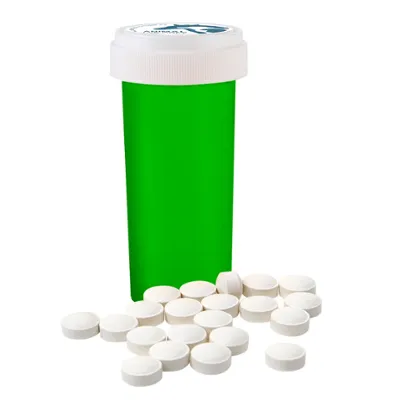 Metronidazole pills in a small dish, representing medication for canine use
Metronidazole pills in a small dish, representing medication for canine use
Proviable DC Capsules
Proviable DC capsules are a veterinary-specific probiotic supplement designed to restore the balance of healthy gut bacteria. Each capsule contains seven carefully selected species of live, beneficial bacteria (probiotics) and prebiotics, which serve as food for these good bacteria. Administered once daily by mouth, or as directed by your vet, Proviable DC helps to re-establish a robust gut flora after it has been disrupted by diarrhea, stress, or antibiotic treatment, thereby promoting healthy digestion and immune function.
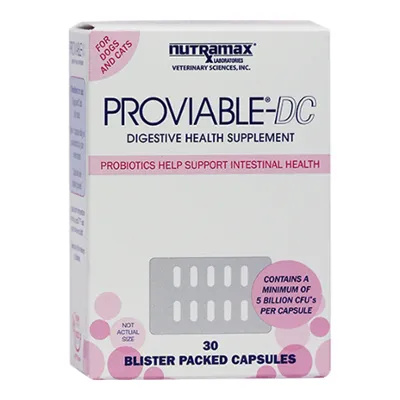 Proviable DC Capsules box for canine digestive health
Proviable DC Capsules box for canine digestive health
Proviable Forte Chewable Tablets
Similar to the DC capsules, Proviable Forte Chewable Tablets also serve as a probiotic supplement aimed at enhancing good gut health in dogs. They contain a concentrated blend of beneficial bacteria and prebiotics, making them a convenient alternative for dogs who prefer chewable formulations. These tablets are typically given once daily by mouth, or according to your vet’s specific instructions, to support digestive balance and combat the effects of diarrhea.
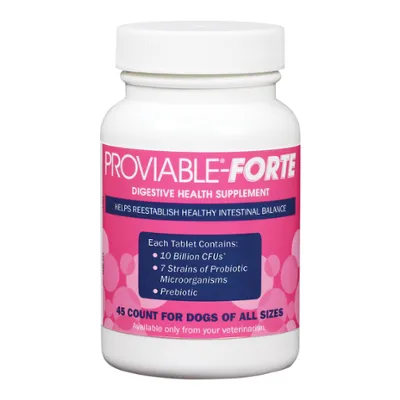 Proviable Forte Chewable Tablets packaging, a probiotic for dogs
Proviable Forte Chewable Tablets packaging, a probiotic for dogs
Rx Clay Powder
Rx Clay Powder offers a dual-action approach to diarrhea relief. Firstly, it functions as an adsorbent, meaning it binds to toxins produced by harmful bacteria and other irritants within the gut. These adsorbed toxins are then safely excreted from the body, preventing them from causing further damage. Secondly, the clay aids in promoting water reabsorption in the digestive tract, which helps to firm up loose stools and reduce fluid loss associated with diarrhea. Because the clay itself is not absorbed into the bloodstream, the risk of overdose is minimal, making it a relatively safe option. Dosing is typically one scoop per 10 pounds of body weight, administered orally, or as directed by your veterinarian.
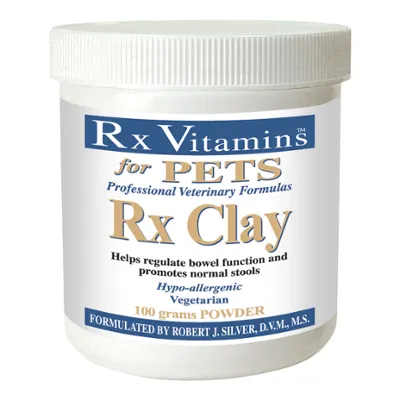 Rx Clay Powder container for veterinary use in treating dog diarrhea
Rx Clay Powder container for veterinary use in treating dog diarrhea
Endosorb Tabs
Also known as canine Endosorb, these chewable tablets are formulated to restore normal stool consistency and provide relief from diarrhea. One of their key active ingredients is attapulgite, a natural clay mineral that works by coating and soothing the irritated intestinal lining. Attapulgite also has adsorptive properties, helping to bind and remove toxins and excess water from the digestive tract. The tablets are typically given by mouth every four hours, with the dosage adjusted according to your dog’s body weight, as per your vet’s instructions.
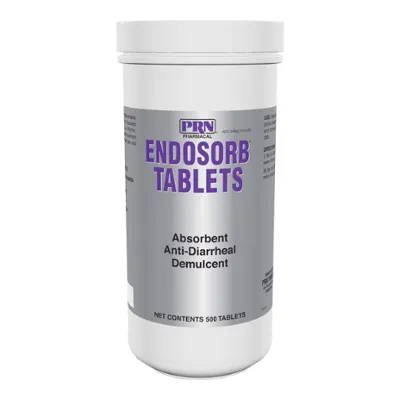 Endosorb Tabs bottle, an anti-diarrhea medication for canines
Endosorb Tabs bottle, an anti-diarrhea medication for canines
Nutrigest Capsules
Nutrigest Capsules are designed to both restore and maintain a healthy balance of beneficial bacteria in the gut and to help repair inflammation and irritation of the intestinal lining that often accompanies diarrhea. These capsules contain a blend of active ingredients, including probiotics for gut flora support and glutamine, an amino acid vital for intestinal cell health and repair. Ingredients like aloe vera are also included for their soothing properties on the digestive tract. Dosing is typically two to three times daily, adjusted by body weight, and administered as directed by your vet. For dogs facing multiple health challenges, comprehensive care is key; just as we seek solutions for digestive issues, understanding options like home remedies for severe itching in dogs can be vital for their overall comfort and well-being.
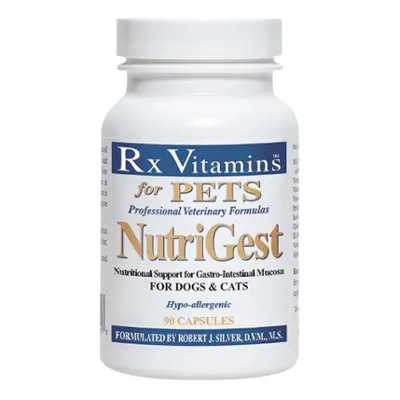 Nutrigest Capsules packaging for canine digestive health support
Nutrigest Capsules packaging for canine digestive health support
How to Choose the Right Anti-Diarrhea Prescription Medicine for Dogs
The decision of which anti diarrhea prescription medicine for dogs is best should always be made in close consultation with your veterinarian. Self-diagnosis and self-treatment can be risky and may delay appropriate care, potentially worsening your dog’s condition. Your vet may recommend an examination and diagnostic tests, such as fecal analysis, blood work, or imaging, to uncover the precise underlying cause of the diarrhea.
When formulating a treatment plan, your veterinarian will carefully consider several crucial factors:
- Cause, Severity, and Duration: Is the diarrhea acute or chronic? Is it mild, or is it causing significant discomfort and dehydration? Identifying the root cause (e.g., bacterial infection, parasites, dietary indiscretion, inflammatory bowel disease) is paramount for targeted treatment.
- Additional Symptoms: Is your dog also vomiting, lethargic, experiencing loss of appetite, or showing signs of pain? These concurrent symptoms can guide diagnosis and influence medication choice.
- Age and Overall Health: Puppies, senior dogs, and those with pre-existing health conditions (like kidney disease, liver disease, or suppressed immune systems) may require different medications or adjusted dosages due to increased sensitivities or potential drug interactions.
- Response to Previous Treatments: If your dog has had diarrhea before, how did they respond to past treatments? This can offer valuable insights.
Always follow your vet’s treatment plan precisely. If they prescribe an anti diarrhea prescription medicine for dogs, ensure you administer it exactly as instructed. Treatment often involves a degree of trial and error, so closely monitor your dog’s symptoms and provide regular updates to your vet. Don’t hesitate to inform them if your dog’s diarrhea is not improving, is worsening, or if new symptoms appear, as the treatment plan may need adjustment.
 Veterinarian conducting a check-up on a dog using a stethoscope
Veterinarian conducting a check-up on a dog using a stethoscope
Essential Tips for Managing Dog Diarrhea & Medication
Dealing with dog diarrhea is unpleasant for both you and your furry friend. To increase the chances of a quick and successful recovery, keep these vet-approved tips in mind:
- Act Quickly, Consult Your Vet: As soon as you notice your dog has diarrhea, especially if it’s severe, bloody, or accompanied by other symptoms, contact your veterinarian. Prompt action can lead to a quicker diagnosis and recovery, potentially preventing the need for more aggressive anti diarrhea prescription medicine for dogs later.
- Follow Instructions Diligently: Whether your vet recommends at-home remedies, a specific diet, or medication, adhere strictly to their instructions. Incorrect dosing or early discontinuation of medication can hinder recovery or lead to recurrence.
- Monitor Your Dog Closely: Be vigilant about your dog’s behavior, appetite, and the nature of their stools. Note any improvements, lack of change, or worsening symptoms. Report these observations to your vet immediately.
- Prioritize Hydration: Diarrhea causes significant fluid loss. Ensure your dog has constant access to fresh, clean water. If your dog is reluctant to drink, or if vomiting is also present, your vet may suggest oral rehydration solutions or even intravenous fluids in severe cases.
- Consider a Bland Diet (If Advised): For many cases of mild diarrhea, your vet might recommend a temporary bland diet, such as boiled chicken (skinless, boneless) and plain white rice. This can help soothe the digestive tract and allow it to recover. Introduce this, or any new food, gradually and only after consulting your vet.
- Preventive Measures: Regularly scheduled vet visits and preventative health care, including effective flea pills for dogs from vet, contribute to a strong immune system and overall health, potentially reducing the incidence of digestive upsets.
Frequently Asked Questions About Anti-Diarrhea Prescription Medicine for Dogs
If your dog is experiencing diarrhea, it’s natural to have many questions about its causes, treatment, and when to seek professional help.
 Concerned dog and owner discussing veterinary care
Concerned dog and owner discussing veterinary care
How long is too long for a dog to have diarrhea?
Most mild, uncomplicated cases of diarrhea in dogs will resolve on their own within 24 to 48 hours. However, if diarrhea persists for more than 48 hours, or if it is severe, bloody, black and tarry, or accompanied by other symptoms like vomiting, lethargy, loss of appetite, or abdominal pain, you should contact your vet immediately. Puppies, senior dogs, and dogs with chronic health conditions warrant quicker veterinary attention.
What should I give a dog with diarrhea and vomiting?
Dogs experiencing both diarrhea and vomiting are at a higher risk of rapid dehydration. The most critical intervention is ensuring adequate hydration. Provide constant access to fresh, clean water. If your dog is unwilling or unable to drink, or if vomiting is frequent, contact your vet immediately. They may recommend small, frequent offerings of an oral electrolyte solution or, in severe cases, require intravenous fluids. Your vet might also advise temporarily withholding food for 12-24 hours to allow the digestive system to rest, followed by a bland diet when vomiting subsides. Never force-feed or over-hydrate your dog, and always follow veterinary guidance.
Is it safe to give human medications to dogs with diarrhea?
Generally, no. Human anti-diarrheal medications contain active ingredients that can be toxic or have severe side effects in dogs. For example, bismuth subsalicylate (in Pepto Bismol and Kaopectate) can lead to salicylate poisoning, and loperamide (in Imodium) can cause neurological issues in certain breeds. These medications can also interact dangerously with other drugs your dog might be taking. Never administer human medications to your dog without explicit advice and dosing instructions from your veterinarian. Your vet is best equipped to determine if an anti diarrhea prescription medicine for dogs or another canine-specific treatment is necessary and safe.
Conclusion
Diarrhea in dogs is a common, often distressing, condition that requires careful attention. While many cases are mild and self-limiting, the potential for serious complications like dehydration and nutrient loss underscores the importance of prompt and appropriate care. Understanding the various medication options—from the cautious use of probiotics to potent anti diarrhea prescription medicine for dogs—empowers you to make informed decisions for your pet’s health.
Always remember that your veterinarian is your most trusted resource. They can accurately diagnose the underlying cause of your dog’s diarrhea and prescribe the safest, most effective treatment plan, tailored to your dog’s specific needs. By acting quickly, following vet instructions diligently, and monitoring your dog’s progress, you can help ensure a swift recovery and maintain your beloved companion’s optimal digestive health.
